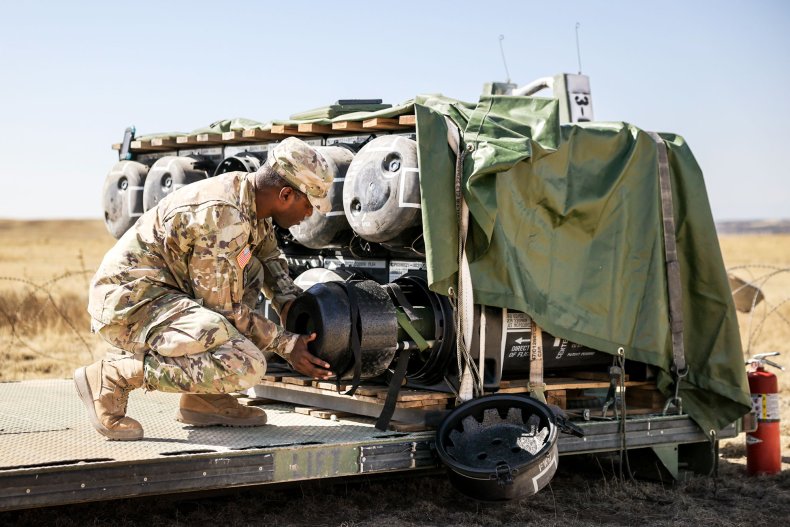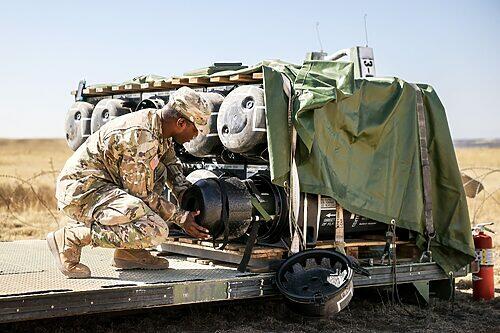Wars have long been credited as a means for increasing employment, from jobs within militaries as well as in companies that build supplies, especially weapons. The ongoing war in Ukraine is no different, and President Joe Biden—who has led the United States to becoming the largest supplier of weapons and aid to Kyiv’s forces—could theoretically see the U.S. economy benefit in the form of new jobs.
Statista Research Department reported earlier this month that the U.S. supplied more than $18.1 billion worth of weapons to Ukraine in 2022 alone. The U.S Department of State’s long list of weapons sent to help Kyiv defend itself from Russian President Vladimir Putin’s forces includes over 2,000 Stinger anti-aircraft systems; over 10,000 Javelin anti-armor systems; 100,000 rounds of 125mm tank ammunition; over 345,000 mortar rounds; and over 1,800,000 rounds of 25mm ammunition. Those items don’t even comprise half of the State Department’s list and doesn’t include helicopters, fighting vehicles, tanks and much more.
Critics—including some U.S. lawmakers—have said that Washington, D.C., is giving away too many weapons and America’s own stockpile will become depleted to the point of leaving the country vulnerable to attacks. However, U.S. weapons manufacturers have increased production, which also means they need more workers to help with building.
Dr. Bradley Martin, director of the RAND National Security Supply Chain Institute, told Newsweek on Friday that there is a “determination to expand production, which is going to result in more jobs.”

“It’s not something that necessarily happens immediately, because it takes some training” to learn how to make weapons, Dr. Martin said. Nonetheless, he noted that “jobs have been added,” even if “it’s not like it’s a huge, major addition to the economy.”
The Wall Street Journal in April wrote defense companies in the U.S. had struggled somewhat with labor shortages after a number of workers furloughed during the coronavirus pandemic didn’t return.
But despite companies reportedly having experienced some difficulty in meeting recruitment goals, the hiring trend has been said to have improved. The Journal said General Dynamics Corp., which builds U.S. Navy ships, hired 24,000 new employees in 2022.
Meanwhile, Lockheed Martin—the biggest weapons manufacturer in the country—recently reported positive news in regards to its employment efforts.
Lockheed Martin CFO Jay Malave said during the company’s most recent earnings call last month when asked if hiring had become easier that “over the past 6 months, our labor availability has improved significantly.”
“We have closed a lot of our key critical skill gaps over this period of time…We’ve seen some lower attrition rates as well as better hiring rates,” Malave said, adding that his company is confident the labor news “also bodes well for the rest of the industry, particularly our supply chain.”
Raytheon, another one of the country’s largest manufacturers, hasn’t responded to a request for comment from Newsweek as of press time while Boeing indicated it didn’t have information to share. A spokesperson for Lockheed Martin provided a statement for this story.
“Lockheed Martin consistently aims to attract and retain the brightest talent to work on the 21st Century Security solutions our customers need to stay ahead of emerging threats,” the spokesperson told Newsweek.
Dr. Martin said that if defense companies have experienced a problem hiring workers, it’s not likely to do with any stigma about working with weapons.
“I think the major problem is that the industry is having the same problem every other industry is having, which is with the unemployment rate being rather low,” he said. “And if somebody has technical skill—the ability to work on a missile—there’s a lot of things that they can do. It’s not particularly that people don’t want to work in the weapons industry; it’s more like they can work so many other places that it’s just hard to attract people.”
While economists and historians have cited World War II as one of the major factors in helping the U.S. recover from the Great Depression, modern wars are not said to be the economic boon they once were. According to Dr. Martin, a lot of that comes down to fundamental changes in the economy .
“When World War II started, there was all kinds of factory capacity that was readily available. What was needed was labor, and what had been lacking was demand,” he said. “Now what’s evolved is a lot of that manufacturing capability has moved out of the country such that trying to recreate, for example, a shipbuilding industry will be extremely difficult. Just because where would you build a shipyard?”
Dr. Heidi Peltier, a senior researcher at the Watson Institute for International and Public Affairs at Brown University and director of programs for the Costs of War Project, outlined another potential issue in regards to job creation in the defense industry.
She told Newsweek that “military spending doesn’t produce as many jobs as some other sectors, like education, healthcare or clean energy.”
Peltier explained that military spending is more “capital-intensive” than other sectors, meaning more spending goes toward “plant and equipment and less goes to labor, so fewer workers are hired.”
“More specifically, this might also apply to the weapons-producing industry, which is very capital-intensive and has gotten increasingly automated, and therefore job growth in companies that are supplying weapons to Ukraine might not keep up with the growth in sales or profits,” she added.





















